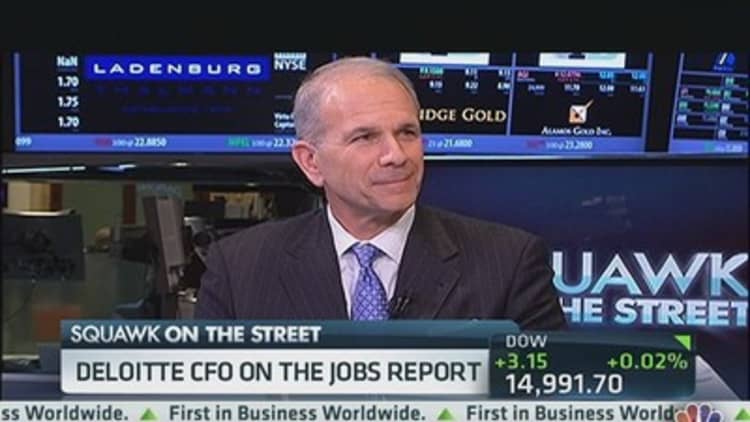Despite the improvement in the overall jobs picture in the U.S— non-farm payrolls grew by 195,000 in June—employment in American manufacturing is still bleak, as the sector lost jobs for the fourth month in a row.
According to the Bureau of Labor, the manufacturing sector lost 6,000 jobs in June.
That follows the loss of 8,000 manufacturing jobs in May and 9,000 in April. March had a loss of 4,000 manufacturing jobs.
"The economy is producing jobs, but they are, generally-speaking, lousy ones," said Scott Paul, president of the Alliance for American Manufacturing, in a press release Friday.
(Read more: Top US States for New Manufacturing Jobs)
"Goods-producing, family-supporting industries like manufacturing are falling behind," Paul said.
"Manufacturing jobs are important to the economy but they're never going to be what they once were," said Tony Cherin, a finance professor at San Diego State University.
There are some 12 million manufacturing jobs on record in the United States. And since January of 2010, the United States has added 520,000 manufacturing jobs, according to the Bureau of Labor Statistics,
But overall, manufacturing has lost a net 21,000 jobs since its last peak this February when the sector gained some 14,000 jobs, according to figures from the BLS.
Comeback Stalled

"We've stalled when it comes to manufacturing job growth," said Chad Moutray, chief economist at the National Association of Manufacturers. "This has fed a lot of doubt as to whether American manufacturing is making a comeback."
The U.S. has a long way to go when it comes to ramping up manufacturing jobs.
A report released last year by Information Technology & Innovation Foundation (ITIF) said that manufacturing in the U.S. declined more in the last decade than it did in the Great Depression.
The ITIF says that translates into some 5.7 million lost jobs in manufacturing—at an "average loss of 1,276 manufacturing jobs every day for the past 12 years."
(Read more: Strong Jobs Report is Gold's Nightmare)
In fact, in January 2012 there were more unemployed Americans (12.8 million) than there were Americans who worked in manufacturing (just under 12 million), the ITIF said.
And even as manufacturing activity grew in June—and recovering from an unexpected slowdown jn May—hiring in the sector was the weakest in nearly four years, according to the Institute for Supply Management.
During his 2012 campaign, President Obama set a goal of creating one million new manufacturing jobs in his second term. Starting on February of this year, according to the the AAM, that would require adding an average monthly increase of 20,833 manufacturing jobs, over the course of 48 months.
However, with the current losses, the figure has risen to 23,000 jobs created every month over the next 48 months, said the AAM.
Manufacturing supports an estimated 17.2 million jobs in the United States—about one in six private-sector jobs, according to the National Association of Manufacturers.
To increase the number, some industry experts, like Scott Paul and Chad Moutray, have called on the president to be more aggressive with trade deals to promote exports of American goods, while also calling on Obama for more investment in U.S. infrastructure—as well as cutting taxes to increase consumer spending.
But getting the sector anywhere near where it once was is very unlikely, said Cherin of San Diego State. It will be difficult just preventing it from falling even more, he said.
(Read more: Jobs Report Shows Good News Can Be Bad for Stocks After all)
"We have some areas where it might do well, like in high tech areas of aircraft and electronics, if we keep working to improve them, and keep them up to date." Cherin argued.
"But we are never going to see manufacturing in this country like it was," he said.
"We've become a more service and information industry economy, and while manufacturing is still important, it doesn't carry the weight it once did," Cherin said.


